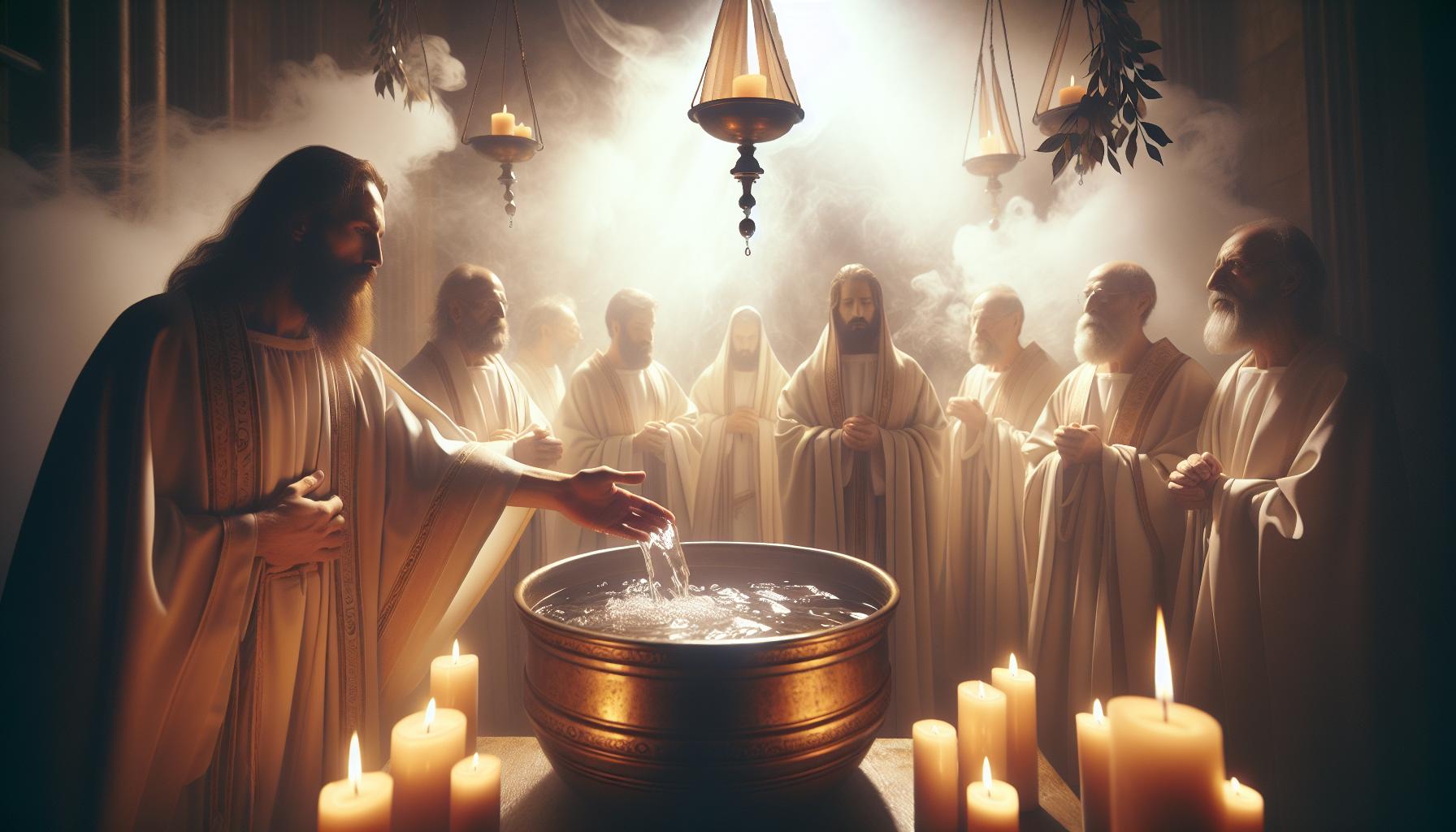Why do countless believers around the world consider baptism a cornerstone of their faith? This sacred rite holds profound spiritual significance, symbolizing purification, commitment, and the beginning of a transformative journey. Understanding its importance not only enriches one’s spiritual life but also fosters deeper connections within the community of believers.
Understanding the Symbolism of Baptism in Christian Faith
The act of baptism is steeped in rich symbolism that reflects core tenets of the Christian faith. For believers, it serves as a profound rite of passage, embodying themes of death, rebirth, and spiritual cleansing. The water used in baptism symbolizes purification and the washing away of sin, while the act itself represents an individual’s commitment to follow Jesus Christ. This multifaceted ceremony not only marks the beginning of a believer’s journey in faith but also stands as a communal declaration of shared beliefs across the Christian community.
Historical Context
Understanding the symbolism of baptism requires a look back at its historical roots. Traditionally, baptism is derived from the Jewish practice of ritual washing, which represents cleanliness and spiritual readiness. In the New Testament, Jesus Himself was baptized by John the Baptist, marking the formal inauguration of His ministry. This moment not only exemplifies obedience to God’s will but also introduces baptism as an essential sacrament within Christianity. The significance of such an act is profound; it affirms the importance of publicly declaring faith in Jesus.
Spiritual Significance
The spiritual implications of baptism can be understood through several key elements:
- Identity in Christ: Through baptism, believers publicly affirm their faith and declare their new identity as part of the body of Christ.
- New Birth: Baptism symbolizes spiritual rebirth, echoing Jesus’ teaching in John 3:5 about being born of water and the Spirit.
- Community and Unity: Participating in baptism fosters a sense of belonging and connection within the larger church community, reinforcing shared faith and values.
- Commitment to Discipleship: It marks the individual’s commitment to live in accordance with Christ’s teachings and follow His example.
Modern Applications
The practice of baptism today varies across denominations, yet its underlying symbolism remains intact. For instance, many churches incorporate a testimony before baptism, allowing the individual to share their life-changing experiences and reasons for their decision to follow Christ. This is not only personal but serves as a powerful reminder to witnesses of God’s transformative love.
Moreover, in a world where spiritual exploration is prevalent, baptism provides a clear, tangible step toward faith. It encourages believers to reflect on their journey and recognize the importance of their faith in shaping their identities and communities.
| Symbol | Significance |
|---|---|
| Water | Cleansing of sin |
| Immersion | Identification with the death and resurrection of Christ |
| Sacred oil | The Holy Spirit’s anointing |
| White garments | Purity and a new life in Christ |
The layers of meaning behind baptism illustrate its importance in the Christian belief system and provide compelling reasons for individuals to embrace this sacred tradition as part of their spiritual journey. Through understanding its symbolism, believers are equipped to appreciate the ritual not just as a formality, but as a transformative experience that aligns them with their faith and community.
The Historical Context of Baptism and Its Evolution
Throughout history, baptism has served as a transformative ritual, marking the initiation of believers into the faith community. Interestingly, the practice has been embedded in various cultures long before Christianity, with purifying waters symbolizing rebirth and renewal. This deep historical context not only emphasizes the significance of baptism for personal faith journeys but also highlights its evolution as a core component of spiritual practice.
Origins in Ancient Cultures
Baptism, in the forms we recognize today, can trace its roots to ancient rituals across different civilizations. Early Egyptians and Greeks used water for purification and cleansing, often linked to religious ceremonies. For instance, the Egyptian rite of “the waters of life” paralleled the foundational aspects of baptism, involving the immersion of participants to symbolize renewal and spiritual awakening.
Similarly, the Jewish tradition has long utilized water rites, most notably the practice of *mikvah*, which involves ritual immersion for purification, particularly before significant religious events. This historical inclination towards water as a cleansed force laid the groundwork for the Christian adaptation of baptism. As followers of Jesus began to recognize the symbolic elements drawn from these customs, baptism emerged as not just a ritual of cleansing, but a profound declaration of one’s faith.
Evolution within Christianity
The inception of baptism as a Christian sacrament is deeply entwined with the ministry of John the Baptist, who called for repentance and encouraged the use of water in his baptisms. Jesus himself underwent baptism, establishing it as a vital practice. Over the centuries, various Christian denominations have embraced different interpretations and methods of baptism, emphasizing its significance in diverse ways:
- Infant Baptism: Adopted predominantly in Catholic and some Protestant traditions, this practice symbolizes the belief in original sin and the necessity of divine grace.
- Believer’s Baptism: Common in Baptist and evangelical circles, this approach requires an individual testimony of faith before baptism, emphasizing personal commitment and understanding.
- Sprinkling vs. Immersion: While some denominations opt for sprinkling water (affusion), others maintain the practice of full bodily immersion (immersion) to embody a symbolic burial and resurrection with Christ.
The variations in baptismal practices highlight not just theological differences, but also the evolving understanding of the ritual’s spiritual significance among believers. As cultures and communities change, so too does the interpretation and importance of baptism, reflecting the ongoing dialogue between tradition and individual faith experiences.
The Continuing Relevance
In contemporary religious practice, baptism still resonates with many believers as a powerful testament to personal faith and identity. It serves not only as a rite of passage but also reunites individuals with centuries-old traditions that enrich their spiritual narratives. Organizations often encourage discussions around this sacred act to reinforce its relevance, leading to deeper communal and individual reflection on what it means to be baptized in today’s world.
With this evolving understanding, baptism continues to be a cherished component of the faith experience, captivating the hearts of believers and underscoring the ongoing importance of this powerful ritual as a symbol of transformation, belonging, and commitment to a life of faith.
The Spiritual Journey: What Baptism Means for Believers
The act of baptism resonates deeply in the hearts of Christian believers, symbolizing more than just a simple ritual. It marks a profound transformation in one’s spiritual journey, encapsulating the essence of faith and commitment to a life guided by the teachings of Jesus Christ. Beyond the physical immersion in water, baptism signifies a believer’s desire to publicly declare their faith, embrace the community of believers, and embark on a lifelong path toward spiritual growth.
New Beginning and Cleansing
For believers, baptism serves as a powerful symbol of purification and rebirth. It represents the washing away of past sins and the beginning of a new life in Christ. This transformation is often reflected in biblical narratives:
- Rebirth: Just as Jesus instructed Nicodemus about being “born again” (John 3:3), baptism is an outward demonstration of this inward change, bringing new life to the believer.
- Symbol of Cleansing: In Acts 22:16, the call to “get up, be baptized and wash your sins away” reinforces the view of baptism as a cleansing ritual, purging the believer from their former ways.
Community and Identity
Being baptized also carries the weight of community belonging and identity formation. When individuals choose to undergo baptism, they are not only affirming their faith but are also entering a supportive fellowship of believers. This communal aspect is vital as it fosters accountability and encourages spiritual growth among brethren.
- Public Declaration: Baptism allows believers to publicly affirm their commitment to Christ, as seen in Matthew 10:32: “Whoever acknowledges me before others, I will also acknowledge before my Father in heaven.”
- Support System: Church community acts as a network of support, providing encouragement, teaching, and mentorship in one’s spiritual journey post-baptism.
| Aspect | Significance |
|---|---|
| Rebirth | A fresh start through Christ, symbolizing renewal and hope. |
| Cleansing | Washing away sins, marking the believer’s commitment to a new way of life. |
| Public Declaration | A tangible expression of faith, uniting believers in their shared conviction. |
| Community | A bond with fellow believers, fostering mutual support and growth. |
In addition to personal and communal significance, baptism serves as an essential step in fulfilling the Great Commission. By participating in this sacred act, believers not only affirm their faith but also take part in the mission of welcoming others into the fold of Christianity, embodying the spirit of evangelism that is at the heart of their faith. This dynamic interplay between individual commitment and communal engagement underscores the vital role baptism plays in the spiritual journey of believers, marking a transformative step towards a deeper relationship with God.
The Role of Community in the Baptism Experience
Community plays a pivotal role in the baptism experience, elevating the significance of this sacred rite beyond the individual to encompass a collective spiritual journey. Baptism is not merely a personal declaration of faith; it is an act steeped in relational dynamics, with the church community serving as both witness and participant in the transformation of an individual’s life. The communal aspect fosters accountability, encouragement, and a sense of belonging that is essential for spiritual growth.
Shared Rituals and Collective Celebrations
When a believer undergoes baptism, they are often surrounded by friends, family, and fellow congregants, creating an atmosphere of joy and celebration. This communal environment enhances the spiritual significance of baptism:
- Strengthened Bonds: The presence of the community solidifies relationships as individuals rally together to support the newly baptized.
- Witness to Faith: Friends and family become witnesses to their commitment, which can inspire others to reflect on their own faith journeys.
- Collective Worship: Shared songs, prayers, and testimonies during the baptismal service enrich the experience, creating a memorable and spiritual moment that resonates within the community.
A Source of Support and Accountability
The role of community extends far beyond the baptismal moment. After the ceremony, a supportive church network continues to play an essential role in the believer’s spiritual growth. This ongoing relationship can be characterized by:
- Mentorship Programs: Engaging in mentorship opportunities, where seasoned believers guide newer members, facilitates deeper understanding and commitment to faith.
- Regular Gatherings: Participation in small groups or Bible studies allows individuals to discuss their spiritual progress, providing a platform for sharing struggles and victories.
- Encouragement in Challenges: A strong community can uplift members during challenging times, reminding them of their baptismal vows and encouraging them to stay the course in their faith journey.
Examples of Community Engagement in Baptism
The intersection of community and baptism is beautifully illustrated in various church practices. Some examples include:
| Practice | Description |
|---|---|
| Group Baptisms | Conducting ceremonies where multiple individuals are baptized at once fosters a sense of unity and shared experience. |
| Baptism Classes | Offering preparatory classes involving current members allows for interaction and support, helping candidates understand their commitment. |
| Celebration Services | Planning a special service to celebrate baptisms, complete with testimonies from the baptized, enriches the entire community’s faith experience. |
Through these practices, the church becomes a welcoming environment where the spiritual significance of baptism is not only recognized but actively celebrated, reinforcing the idea that faith is a shared journey. For believers, the importance of baptism amplifies when coupled with community involvement, emphasizing that this sacred act is as much about individual transformation as it is about the collective body of Christ.
Baptism as a Public Declaration of Faith
The act of baptism is widely recognized as a monumental moment in the spiritual journey of believers, acting as a powerful symbol of their faith. Rather than merely being a ceremonial ritual, baptism serves as a profound public declaration of one’s relationship with Christ. This sacred practice is often filled with personal significance, reflecting a commitment to a spiritual path that many individuals choose to share with their community.
Understanding the Public Aspect
When a person is baptized, they aren’t simply engaging in a personal expression of their faith; they are showcasing their devotion before family, friends, and fellow congregants. This communal aspect fulfills several important functions:
- Accountability: By declaring their faith in a public setting, individuals create a support system. Their community becomes invested in their spiritual growth, offering encouragement and guidance along their journey.
- Encouragement: Seeing others take the step of baptism can be inspiring, encouraging more individuals to affirm their own faith openly and proudly.
- Witnessing Transformation: Baptism symbolizes a transformative process—a new beginning. Witnessing this event can rekindle faith in others, showcasing the power and grace of spiritual rebirth.
The Biblical Foundations of Public Declaration
Scripture supports the importance of . In the New Testament, several passages highlight this concept:
| Scriptural Reference | Context |
|---|---|
| Matthew 28:19-20 | The Great Commission emphasizes the call to share the Gospel, which includes the practice of baptism for believers. |
| Acts 2:38-41 | This passage emphasizes the importance of repentance and baptism, as seen by the response of thousands who chose to publicly declare their faith on the day of Pentecost. |
| Romans 6:4 | Baptism serves as a representation of dying to sin and being raised in new life—a public testimony of one’s beliefs. |
These scriptures show the vital connection between baptism and the communal identification of faith. When believers step into the water, they are not only declaring their own personal beliefs but also joining a larger body of believers, reaffirming the shared values and missions of the faith community.
In conclusion, baptism serves as a significant public affirmation of an individual’s faith journey, reinforcing the sense of belonging within a collective of like-minded believers. Through this sacred act, individuals communicate their commitment not only to their spiritual path but also to the community that supports and uplifts them in their walk with God.
The Theological Foundations: Scriptural Insights into Baptism
The act of baptism is more than a ritual; it is a profound spiritual milestone rooted in centuries of theological reflection and scriptural mandates. Throughout the Bible, baptism is depicted not merely as a ceremony, but as a divine command and a profound means of grace for believers. It symbolizes an inward transformation and unites the individual with Christ’s death, burial, and resurrection. Exploring these scriptural foundations reveals the rich tapestry of meaning behind baptism, highlighting its importance in the life of every believer.
Scriptural Foundations of Baptism
Numerous passages throughout the New Testament elucidate the significance of baptism. Here are some key insights:
- Jesus’ Command: In Matthew 28:19-20, Jesus commissions His followers to “make disciples of all nations, baptizing them in the name of the Father and of the Son and of the Holy Spirit.” This directive emphasizes that baptism is integral to the process of discipleship.
- Identification with Christ: Romans 6:4 states, “We were therefore buried with him through baptism into death in order that, just as Christ was raised from the dead through the glory of the Father, we too may live a new life.” This encapsulates the transformative power of baptism, marking the believer’s identification with Jesus’ death and resurrection.
- Public Declaration: Acts 2:38 reinforces the importance of baptism as a public declaration of faith, encouraging believers to “repent and be baptized, every one of you, in the name of Jesus Christ for the forgiveness of your sins.” This reveals baptism as both a personal and communal reaffirmation of belief.
The Role of Baptism in Salvation
Baptism is often mentioned alongside themes of repentance, forgiveness, and new life in Christ, indicating that it plays a crucial role in the faith journey. Although views differ among traditions regarding the mechanics of salvation and baptism, the consistent biblical narrative affirms that:
| Aspect | Baptism’s Role |
|---|---|
| Obedience | Acts as an act of obedience following faith in Christ |
| Symbolism | Signifies washing away of sins and entering into the community of believers |
| Spiritual Renewal | Associated with the idea of being born again (John 3:5) |
This highlights baptism as a multidimensional act — one that not only marks a believer’s obedience but also aspires to convey the transformative essence of their newfound faith. Recognizing these scriptural insights into baptism equips believers with a deeper understanding of its spiritual significance, compelling them to appreciate their own baptism as a vital step in their faith journey. By reflecting on these principles, individuals can approach their baptism not just as a rite of passage, but as a sacred affirmation of their commitment to Christ.
Personal Reflections: How Baptism Transforms Lives
Witnessing the transformation in individuals who embrace baptism can be a profound experience, akin to watching the dawn of a new day. The moment a believer emerges from the waters, there is an undeniable sense of renewal that permeates not only their lives but also the lives of those around them. Baptism is not merely a ritual; it symbolizes an inner shift, a commitment to embrace a life aligned with spiritual values and community.
This sacred act carries profound significance that often leads to a transformation that transcends personal faith. Many recount feelings of liberation as they let go of past burdens and embrace a fresh start. In this journey, believers frequently describe:
- A Deepened Sense of Purpose: Following baptism, individuals often report a stronger connection to their life’s mission. They feel equipped to serve others and contribute positively to their communities.
- Strengthened Relationships: Baptism fosters a sense of belonging within a faith community, leading to an increase in supportive relationships. These connections often bolster one’s emotional and spiritual well-being.
- Enhanced Spiritual Growth: The commitment made during baptism often serves as a catalyst for ongoing spiritual journeys. Many find themselves eager to learn more about their faith and engage in practices that deepen their understanding.
Personal Stories of Transformation
Real-life examples illustrate the transformative power of baptism. For instance, John, a former skeptic, shared how his baptism marked a turning point in his life. He turned away from a lifestyle fraught with uncertainty and negativity, embracing instead a commitment to personal growth and community service. This transformation reshaped not only his life but also impacted his family, inspiring them to seek their own spiritual paths.
Conversely, Maria, who grew up in a faith-filled environment, expressed how baptism solidified her identity. The moment she was submerged and emerged, she felt an overwhelming sense of clarity about her purpose. It provided her the courage to pursue her lifelong dream of helping others through charitable work.
| Before Baptism | After Baptism |
|---|---|
| Struggling with doubt and uncertainty | Renewed sense of faith and clarity |
| Isolation and lack of community | Strong bonds with fellow believers |
| Feeling unfulfilled in life | Active pursuit of personal and spiritual goals |
These examples illuminate the truth about baptism’s importance—a spiritual practice that catalyzes profound change within individuals and communities, enriching their lives and those they touch. For believers seeking a deeper connection, participating in baptism signifies more than a ritual; it represents a decisive step towards a transformative and empowered life.
Preparing for Baptism: Guidance for Individuals and Families
Embarking on the journey towards baptism is a moment filled with profound meaning and spiritual significance for individuals and families alike. This sacred act not only symbolizes a personal commitment to faith but also serves as a powerful connection to the broader community of believers. Understanding how to prepare both spiritually and practically can enhance this experience, allowing participants to embrace the transformative nature of baptism from a place of readiness.
Spiritual Preparation
Before the baptism day arrives, it’s crucial for individuals and families to engage in spiritual introspection. This can involve:
- Prayer: Dedicate time for personal and collective prayers, seeking guidance and understanding of the profound commitment being made.
- Bible Study: Delve into scripture passages that explore the significance of baptism. Consider discussing verses such as Matthew 28:19-20 and Acts 2:38 with family members to foster deeper understanding.
- Faith Conversations: Hold open discussions about what faith means to each person, thereby strengthening the family bond and encouraging individual reflections on the commitment of baptism.
Practical Steps for Families
In addition to the spiritual dimensions, there are practical elements to consider, ensuring a smooth baptism experience. Here is a simple checklist:
| Task | Description | Deadline |
|---|---|---|
| Contact the Church | Ensure that you book the baptism service and discuss any requirements. | 4-6 weeks prior |
| Gather Family | Inform family and friends about the baptism date and invite them to celebrate. | 3 weeks prior |
| Choose Attire | Select appropriate garments, considering comfort and symbolism. | 2 weeks prior |
| Plan the Celebration | Consider a gathering post-baptism to celebrate this milestone. | 1 week prior |
Embracing Community Support
Baptism is often seen as a communal event in many faith traditions. Engaging closely with the community can enrich your family’s experience. Seek out mentors or sponsors who can offer guidance and support, helping the individual navigate their faith journey post-baptism. In addition, families could explore local church groups or service activities to connect with fellow believers, emphasizing the importance of not just individual commitment, but also a shared faith journey within the community.
Equipping yourself and your family with spiritual insight, practical planning, and community engagement prepares you to fully embrace the importance of baptism, making this a truly unforgettable milestone in your faith journey.
Q&A
What is the Importance of Baptism?
What is the importance of baptism?
Baptism is a significant rite of initiation for believers, symbolizing their faith and commitment to follow Jesus Christ. It marks the beginning of the Christian journey and reflects profound spiritual transformation.
Throughout the Bible, baptism represents a public declaration of faith, as seen in Matthew 28:19, where Jesus commands His followers to baptize all nations. It embodies the cleansing from sin and the rebirth into a new life in Christ. For those exploring the faith, understanding the significance of baptism is essential.
Why does baptism hold spiritual significance for believers?
Baptism is spiritually significant as it symbolizes purification, rebirth, and the believer’s union with Christ. It reflects the death of the old self and the emergence of a new creation.
Through baptism, believers publicly affirm their faith and commitment to God. This sacrament not only marks a new beginning but also serves as a reminder of God’s grace working in their lives, as emphasized in 2 Corinthians 5:17. Understanding this helps reinforce the spiritual journey of each believer.
Can I be baptized more than once?
While many denominations believe in one baptism, some allow for a second baptism under specific circumstances. This often depends on individual faith journeys and changes in belief.
For instance, believers who feel they have rededicated their lives or changed faith traditions might seek re-baptism. However, it’s vital to discuss your intentions with a spiritual leader to respect the traditions of your faith community. Each situation can vary based on personal and doctrinal beliefs.
How does baptism relate to the teachings of Jesus?
Baptism is closely related to the teachings of Jesus as it represents obedience and alignment with His mission. Jesus was baptized to fulfill all righteousness, setting an example for believers.
In His ministry, Jesus emphasized the value of spiritual rebirth, as highlighted in John 3:5. This act reflects the commitment to live according to His teachings and the call to discipleship. For believers, understanding this connection enhances their faith and practice.
What are the different types of baptism?
There are several types of baptism, including infant baptism, believer’s baptism, and baptism by immersion or pouring. Each serves different theological perspectives and community practices.
For example, infant baptism is common in some Christian traditions to signify God’s grace from the beginning. In contrast, believer’s baptism emphasizes personal faith and commitment. Understanding these differences helps believers appreciate the rich traditions within Christianity.
What should I know before getting baptized?
Before getting baptized, it’s essential to understand the meaning and significance of the sacrament in your faith community. This includes reflecting on your beliefs and commitment to following Jesus.
It’s also crucial to participate in any preparatory classes your church offers, which often discuss the theological implications of baptism. Engaging with your community and practicing prayer can also enrich this spiritual milestone. For more guidance, explore our comprehensive baptism resources.
Why do different Christian denominations view baptism differently?
Different Christian denominations view baptism in varied ways due to differing interpretations of scripture and theological beliefs. These differences reflect each community’s understanding of grace, faith, and the role of baptism.
For example, some denominations practice infant baptism believing in covenant theology, while others advocate for believer’s baptism emphasizing personal faith. Recognizing these differences can foster greater understanding and unity among Christians, highlighting the diversity within the Body of Christ.
Final Thoughts
In conclusion, understanding the importance of baptism is a journey steeped in spiritual significance, rich theological tradition, and personal transformation. As believers, we embrace baptism not only as a sacred rite of initiation but also as a profound declaration of faith and commitment to a life following Christ. Each aspect—from its scriptural foundations to the communal support it fosters—invites us to reflect on our own spiritual journeys and the call to live in accordance with the teachings of our faith.
We encourage you to explore the depths of this sacred practice further. Whether you are contemplating baptism for yourself or seeking to support others in their spiritual walk, consider engaging with your local faith community, participating in discussions, or studying the scriptures that highlight the beauty of this sacrament. Each step in this exploration not only strengthens personal faith but also enriches our collective understanding of what it means to be part of a faith-filled community. Embrace the invitation to learn, grow, and share the significance of baptism in your life and the lives of those around you.





